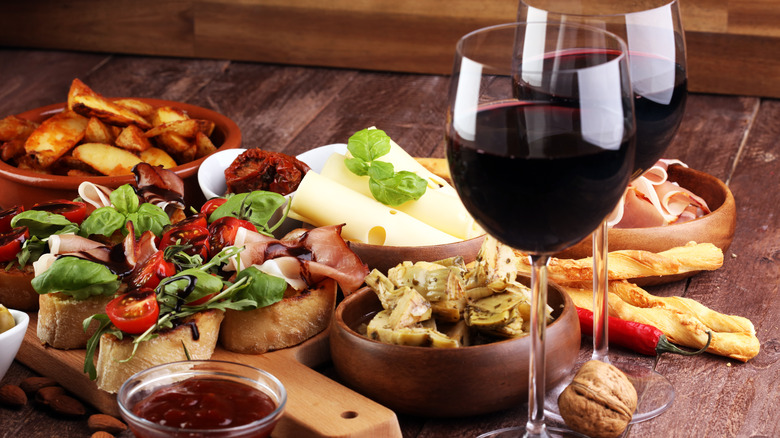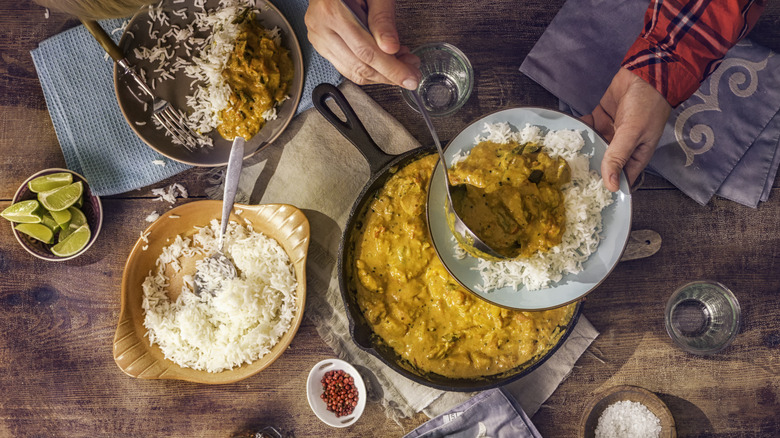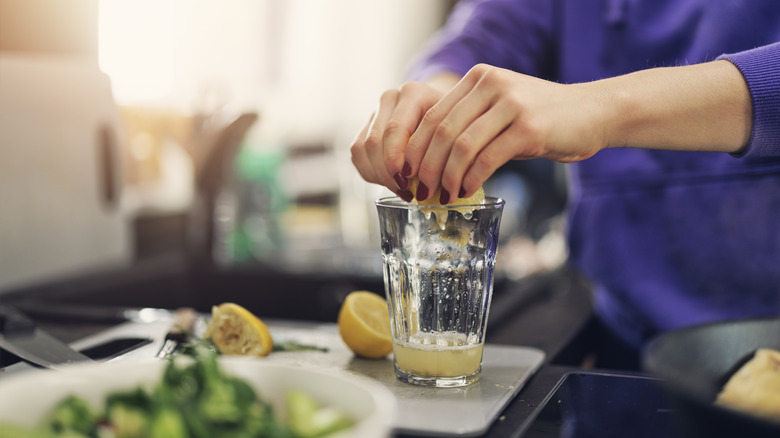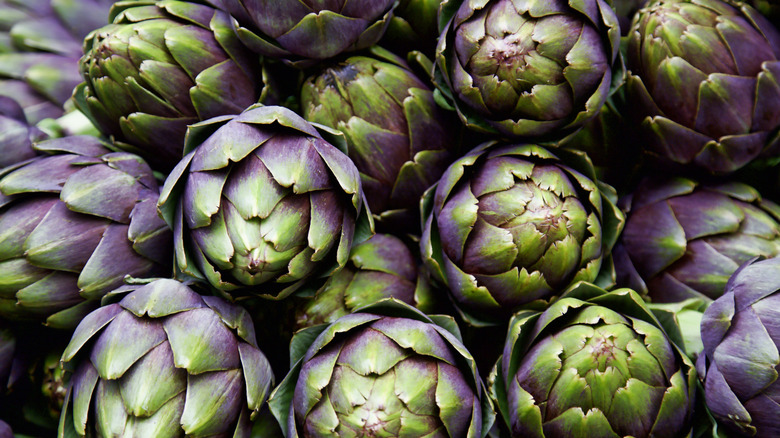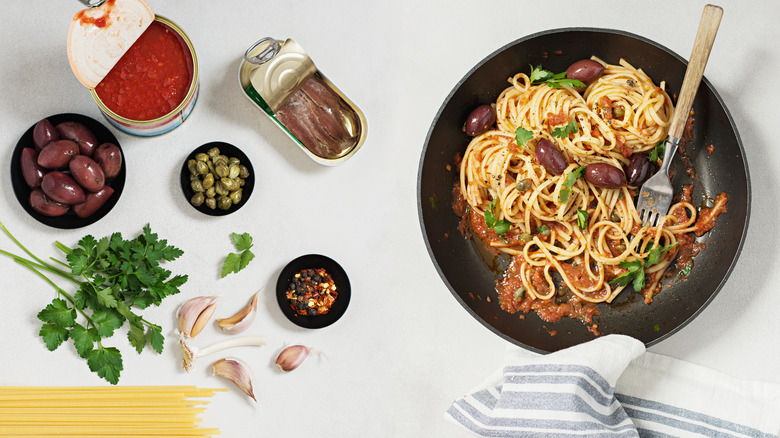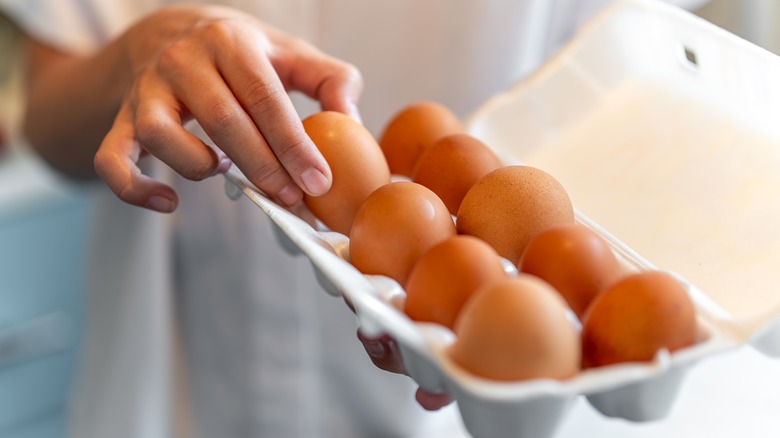The 5 Most Difficult Ingredients To Pair With Wine, According To An Expert
When planning a special dinner at home, preparing an outstanding meal is likely at the forefront of your mind, but don't let your beverages fall on the back burner. We know that steak goes great with full-bodied reds, and white wines pair well with salmon and other seafood, allowing their delicate, briny notes to shine. But some flavors can be harder to pair wine with, and many hosts make the mistake of picking a bottle of wine based on the label alone to avoid the challenge altogether.
To help you avoid unnecessary blunders when choosing the right vino, Food Republic reached out to Catherine Fallis, Master Sommelier at Planet Grape, to get her advice on pairing wine with notoriously tricky foods. She shared her thoughts on five ingredients that are tough to pair with wine; the qualities that make them such a challenge; and tips to help you choose a bottle that's suited to the big, bold flavors you want to highlight.
Curry
Taking the lead on Catherine Fallis' list of most challenging ingredients, we have curry. Serving up complexity and spice in every form it takes, the bold flavors of curry don't leave a lot of room for wine to shine. But wine pairing is about balancing and finding harmony in a dish — not necessarily matching its energy note for note.
Instead of seeking out a bold, attention-grabbing wine, Fallis recommends choosing something that will refresh your palate and provide reprieve as you eat: "A racey, lightly sweet and delicate wine such as a classic German Riesling would work nicely." This way, your tastebuds won't be overwhelmed with a double punch of tannin-heavy wine and spiced, flavorful curry sauce.
Lemon juice
Thanks to its high acidity, lemon juice can fundamentally change the flavor profile of the wine you're drinking by masking the drink's own tart notes and making it taste sweeter than it really is. Pairing food and wine is about striking up a conversation between two flavors, so having one wash out the other is not ideal — not to mention a sugar-sweet wine rarely pairs well with a savory meal.
To prevent a clash of egos, Fallis recommends a wine "in that rare category of being dry and having [its] own searingly high natural acidity, such as Grosses Gewachs Riesling from Germany, New Zealand Sauvignon Blanc or Brut Nature Champagne." These bracing varieties will stand up to the acid of the lemon juice, allowing you to enjoy both flavors simultaneously.
Artichokes
Artichokes are often deemed an impossible case in the world of wine pairing. This is because it contains a naturally occurring compound called cynarin (also spelled cynarine), which temporarily alters your tastebuds and makes whatever you consume in conjunction taste sweeter than it really is. It's almost like lemon juice, in this way.
To reduce the impact of cynarin and expand your wine pairing possibilities, Catherine Fallis recommends grill or char the artichoke under the broiler or in a cast iron pan. Serve the veggie with a rich, high-fat sauce like cheese sauce or aioli, which will help to mask some of that strong vegetal taste. Fallis noted that "a medium-bodied lightly herbaceous wine such as an Austrian Gruner Veltliner" is best with this dish.
Anchovies and olives
Having wine with Italian and French food is a no-brainer — but even when the cuisine calls for it, choosing the right bottle can be tricky. Ingredients like anchovies and olives, which are common in regional dishes like puttanesca and Provencal caviar, can put up a fight. The levels of salt and umami can be challenging to balance without overpowering — a high tannin wine will especially be challenging against salty dishes.
According to Fallis, these flavors "challenge most rich, ripe, flamboyant warm climate wines," but lighter options that tend to be tart, dry, or even bitter can pair wonderfully. She recommends trying them out with a Chianti or Chianti Classico, which are produced with acidic, tangy Sangiovese grapes that flawlessly support the savory notes of these ingredients.
Eggs
Eggs have a unique savory flavor and delicate texture, and their rich yolk can envelop your mouth, making it difficult to perceive the flavor and body of your wine. Many wines clash with this flavor, too, resulting in a metallic, bitter taste.
If you're preparing a simple egg dish, Catherine Fallis recommends choosing a wine that matches the egg's texture, like a delicate, creamy white. A Spanish Garnacha Blanca or Albarino are both great options.
She notes that you can also choose to add other ingredients, like sausage, bacon, or cheese, to produce a richer, more satisfying egg dinner and increase the range of wine pairing possibilities. A Sangiovese Rosé, sparkling wine like Cava or Champagne, or an Alsace Pinot Blanc would all work well to bring balance without lingering bitterness.

